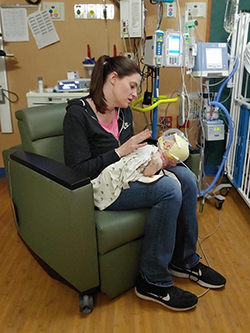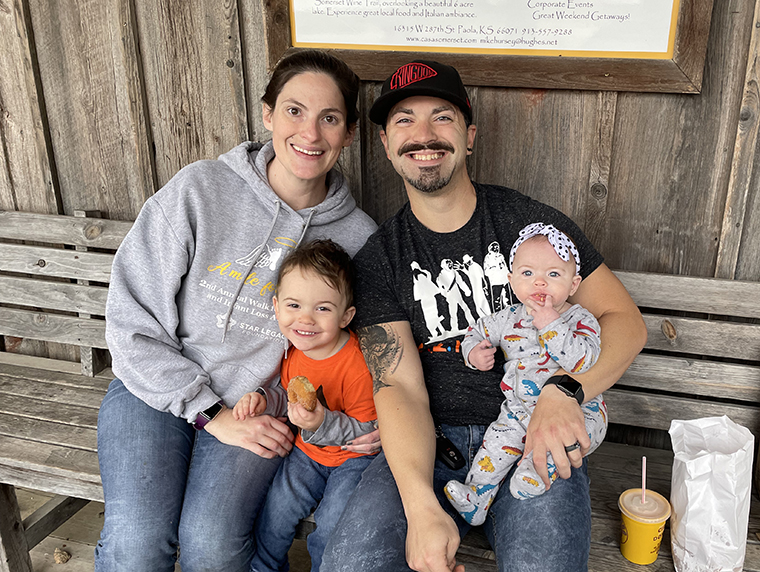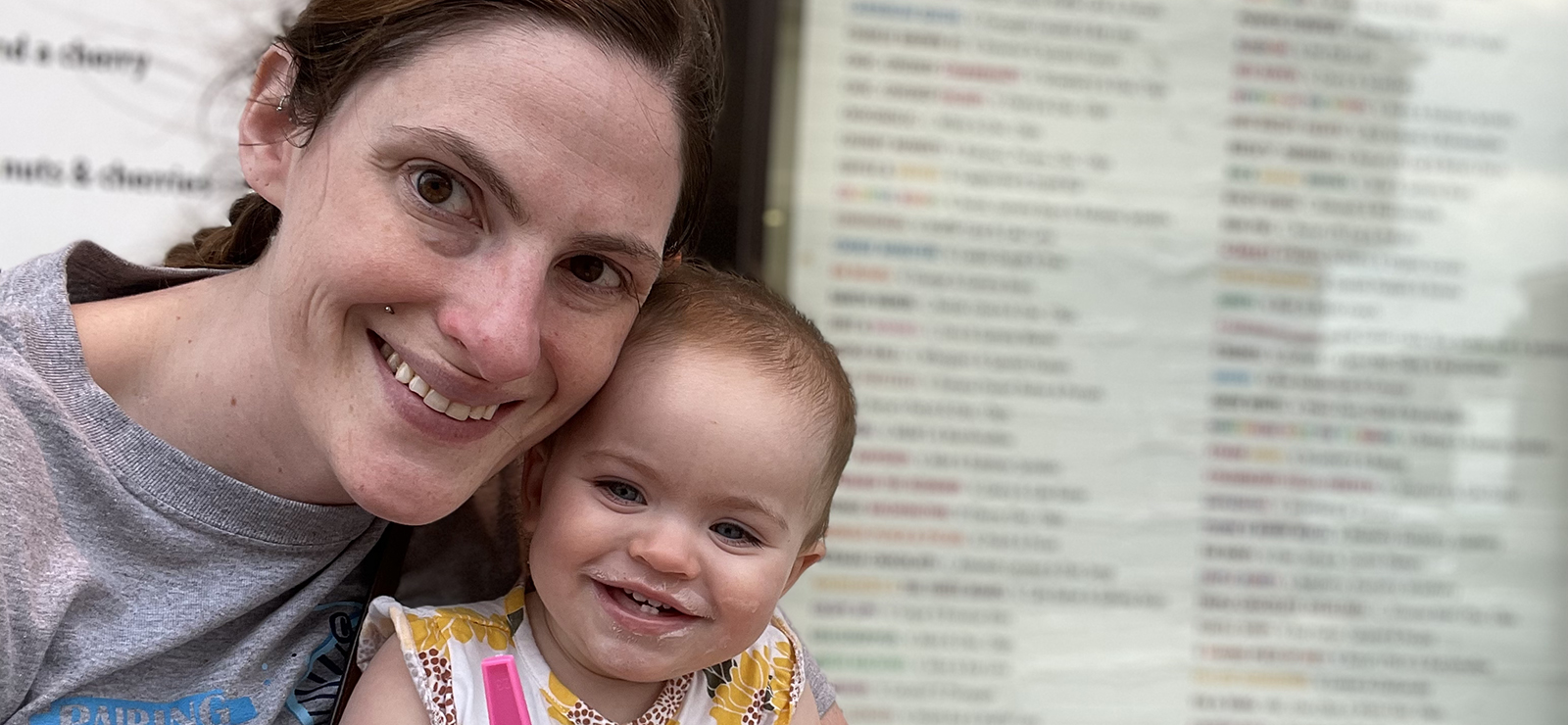By: Aimee Nienstedt Dickson
June 24, 2022

Nov. 13, 2019, felt like any other day at work, except it was my first day back following the birth of my first child, Jonah. The previous weeks had included a birth at an unplanned hospital, with an unknown doctor, and a NICU stay on top of other life stressors. The return to work was not dreaded. As I sat at my desk that November day, a coworker asked me if I was sad to be back. I distinctly remember thinking, “Of course not. It feels good,” immediately followed by, “What type of mother am I that I’m not crying about the first day back?”
Several weeks earlier, my husband had returned to work. This left me alone with the baby and my own thoughts. I laid awake at night wondering if it was my fault the baby had such a rough start, analyzing my interactions, questioning if I loved him enough, worrying if I had sterilized the baby items as long as required and more. The shame of some of these thoughts felt suffocating. We fought hard to be parents of this child.

The week after I returned to work started another nearly three-week hospital stay for Jonah. A day or two after he was admitted to the PICU, I returned to work once again. This time, I sat at my desk and cried while thinking, “I wish I wanted to be at the hospital.” After all, that is what a “good mother” would want — a mother who wouldn’t have gone to work in the first place, wouldn’t have wondered if they brought home germs and would have missed their baby while at work.
Around the time Jonah was 6 months old, I felt something I had not felt yet: I truly missed him. It was then that I began to acknowledge the reality of how I was thinking and feeling. At that point, I was able to acknowledge things could be better and that I wanted them to be. At his 6-month visit, I talked to our family medicine doctor about feelings of disconnection and difficulty adjusting over the past several months. Our doctor compassionately assured me that my worth as a parent was greater than my symptoms and suggested a referral to the perinatal psychiatry clinic for medication management. Slowly, with medication and behavior changes, the dark cloud began to lift.
Fast forward a few months, and I was pregnant with our daughter, Hannah. During the pregnancy, I struggled with guilt over my son’s short time of being an only child, feeling resentful I had only recently begun to feel like myself again and disconnected from the baby that I was carrying. This was at the height of COVID, adding to the overwhelming thoughts, feelings and isolation from others.
Throughout the pregnancy, I continued to see the perinatal psychiatry team. A few weeks before my daughter’s birth, a doctor asked me how I was doing. It was like the flood gates broke, and I began crying, verbalized some of my worries and was overcome with fear of another postpartum period similar to after my son was born.
Following Hannah’s birth, changing her diaper was overwhelming and making decisions was nearly impossible. There was an unusually long stretch of time I didn’t shower, didn’t ask anyone else to help with the baby and wanted her in my sight at all times. My mind was filled with thoughts of things that could happen to my baby, things that were my fault and things I wished I felt like doing. Postpartum mood disorder presents in a variety of ways. With Jonah, I went through all the motions, though without an overwhelming sense of enjoying my baby. With Hannah, it was like having the wind knocked out of me, but in my gut, my confidence and my drive to do things. It came as feelings of inadequacy, sadness and guilt. Worry. Not allowing myself a break, even when trustworthy people were willing to help. Isolation.
Following some adjustments to my current medication, the perinatal psychiatrist discussed another treatment option called Zulresso. It is the first FDA-approved treatment for postpartum depression. After a discussion with my husband, we decided to pursue the treatment. Fast forward a few weeks, and I was approved to receive the 60-hour continuous IV infusion.
As I checked into the hospital, I worried if I was making the right decision, worried about imposing on others who were helping pick up my responsibilities at home and worried what if I did not go through with receiving Zulresso. While I was receiving the infusion, I was in a hospital room. As a breastfeeding parent, I was able to pump to maintain supply. My infant was able to visit me each day to nurse, and my mom and husband visited as well. A good chunk of the time, I sat with my own thoughts in silence. I read, listened to podcasts and slept. By the halfway mark, I began noticing a shift in mood, as well as relief from the thoughts.
The day I arrived home, I sat with my kids on the floor and played. The joy I felt was unmatched by any other emotion. I thought, “So this is what it feels like to be a parent.” Over the next weeks, there were ups and downs. The symptoms did not immediately go away, though they were manageable. A combination of medication and working with a therapist provided the additional nudge toward healing and being able to thrive as a parent.

Being a parent is a major life transition. There was not anything about becoming a mother that happened like I imagined. Postpartum depression is not what many people envision. Both parents are at risk — when the birthing parent has postpartum depression, the other parent is at a significantly increased risk, as well. Many parents are ashamed or dismissive of their symptoms. In reality, postpartum mood disorders are a complication of childbirth — a complication worth treating. The way parents think and feel affects their behavior, as well as their interactions with their children. Happiness is only a choice to the point of the hole not being too deep, the darkness too dark or the wall too high to climb.
Postpartum mood disorders affect every relationship and many aspects of your life. The decision to tell or not tell others is very personal. No one has the inherent right to know about your journey. It is difficult to navigate potential sources of supports, versus feeling as if you have to defend your choices as a parent, which may be a result of depression or anxiety. While there is no right or wrong decision for disclosing to family and friends, telling your partner is imperative to taking a step toward help. Allowing your doctor, or your child’s doctor, to support your health is crucial to improve your well-being.
A little over a year after my daughter’s birth, my family continues to learn the ins and outs of navigating this season of life in healthy ways. There are days I think to myself, “I love being their mom,” and other days I count the minutes until bedtime. Taking Zulresso was an investment in myself. Healthy parents lead to healthy relationships with your kids, your partner and the community. Even when we don’t believe it, we are worth it. Even when we don’t believe we are worth it, our children are worth us feeling better. Perinatal mood disorders do not have to be your new normal. You deserve to know how much your baby loves you, and how much you love them.
Next Steps and Useful Resources
- Want to chat with a primary care provider about postpartum depression? Find one today.
- Want to learn more about postpartum treatment options? Read more.
- Curious about men experiencing postpartum depression? Read more.


